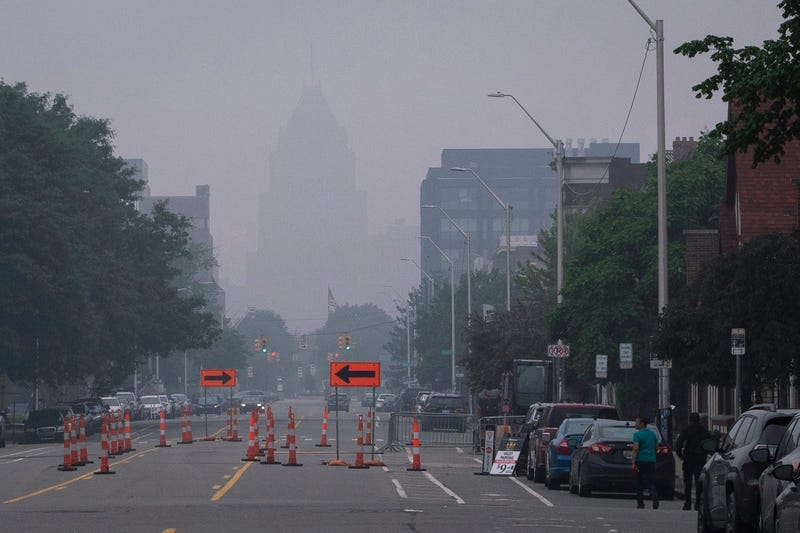
DETROIT (WWJ) - Michiganders woke up to an thick blanket of Canadian wildfire smoke and fog on Wednesday morning like an eerie episode of the "Twilight Zone" that brought visibility restrictions for drivers and air quality values that skyrocketed into the 'hazardous' range.
Now the Air Quality Alert has been extended, continuing until 12 a.m. Friday for Metro Detroit — including Macomb, Wayne and Oakland counties — along with Midland, Bay, Huron, Saginaw, Tuscola, Sanilac, Shiawassee, Genesee, Lapeer, St. Clair, Livingston, Washtenaw, Lenawee and Monroe.
At 4 a.m., Port Huron held one of the worst Air Quality Indexes in the world as values reached near 400. According to the Environmental Protection Agency, levels over 301 endanger the entire population and even healthy Michiganders would be considered at risk for serious health effects.
AQI in Metro Detroit communities at 8 a.m. flirted between the 'Unhealthy' to 'Very Unhealthy' range with communities like Dearborn Heights at 258, River Rouge at 255, and some areas in the downtown area at 275 AQI, as reported by IQ Air.
The National Weather Service reported that dense fog along with Canadian wildfire smoke are bringing visibility restrictions to a quarter mile or less.
The poor air quality even prompted the Detroit Police Department to cancel Chief James E. White's Walk A Mile Wednesday with community and department members.
Local doctors are raising warning bells, such as Dr. Devang Doshi -- an allergist with Corewell Health in Royal Oak -- who says the wildfire smoke pouring into the state from neighboring Canada is causing an extremely unsafe environment.
"This is certainly new in this part of the country, we're not acclimated or accustomed to seeing wildfires causing unsafe breathing, [unlike] in California..." Doshi told WWJ's Jon Hewitt. "We don't typically see that or experience that normally in this part of the country. So this is definitely new and uncharted territory for us."
According to Doshi, Michiganders can expect air quality levels to fluctuate in the coming weeks -- and possibly months -- as long as the record-setting wildfires in Quebec and Alberta continue to rage out of control.
"What we've been telling our patients is everyday, it may look better, it may look worse," Doshi said.
And the patients, he said, have been filling up his office.
"We are having a lot of people calling feeling like they're not feeling well and we're not able to find or see an illness or a respiratory infection," he explained to Hewitt. "Clearly the allergy symptoms are not as bad as they were because of the rain that we've had, but a lot of it is probably air quality is affecting the breathing, in addition to all the other normal things that we see this time of the year with the heat and the pollen."
Doshi went on to say people who are more susceptible to underlying respiratory issues or have a history asthma, COPD or heart disease may feel breathing is even harder on days like Tuesday and Wednesday than what they would experience on a normal day where air quality is good.
"When the air quality is affected, those micro pollutants can irritate aggravate the respiratory system, so patients are gonna experience more symptoms when they're outside."
The EPA advises all outdoor activity for everyone should be suspended when the AQI reaches in the 'hazardous' range. In the 'Very Unhealthy' to 'Unhealthy' groups, events and other activities held outside are urged to move indoors for at risk groups, while healthy person are told to avoid being outdoors for an extended period of time.
Doshi said an AQI of 50 and lower is ideal.
"The higher the number, the more serious of an impact the weather or the outside air quality can have on us," he explained. "Once you get into the 150 range, it's not safe for really anyone to be out for extended periods of time."
Doshi said he has been seen patients on Air Quality Alert days that come into his office complaining of burning, tearing, and irritation in the eyes or saying they feel that their nose or throat is irritated, scratchy or sore, even though they don't have an infection.
"The main one that we worry about obviously is the breathing where people go outside and they're a little more winded, short of breath or they're coughing or they're experiencing this chest tightness, pressure sensation in the chest," the doctor added. "Those are really symptoms that you have to be cautious with because if you're experiencing any sort of respiratory issue where you're having a hard time breathing, coughing or having any chest symptoms, you immediately want to go inside."
If you do have to spend extended period of time outside, experts advise tor people with heart or lung disease, pregnant people, older adults aged 65+, children and teens to take the following steps to reduce exposure:
• Avoid strenuous outdoor activities.
• Keep outdoor activities short.
• Consider moving physical activities indoors or rescheduling them.
For everyone else:
• Choose less strenuous activities (like walking instead of running) so you don’t breathe as hard.
• Shorten the amount of time you are active outdoors.
• Be active outdoors when air quality is better.
Doshi added that residents should "heed the warnings" and pay attention to the news, weather apps and keeping an eye on your area's AQI.
"t is definitely here and we are definitely seeing it as physicians and health care workers," he said.
The Michigan Department of Health and Human Services (MDHHS) has set up a hotline for Michigan residents to ask health-related questions related to air quality issues. The number is 800-648-6942, and is available Monday through Friday, 8 a.m. to 5 p.m., excluding holidays.


